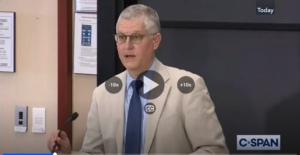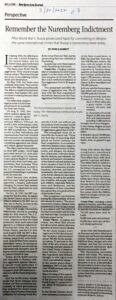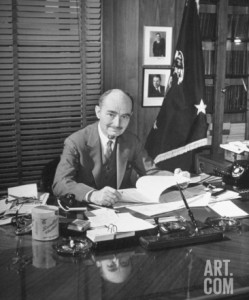I received yesterday the new memoir by Harold Burson, The Business of Persuasion. Now in his tenth decade, Harold is a giant in the field of public relations, co-founder of the global firm Burson-Marsteller, formerly an Armed Forces Radio Network reporter during 1945-46 at the international Nuremberg trial of the principal Nazi war criminals, a truly wise man, and, I’m very lucky to say, my friend.
I have only begun to read the book. So far it’s smooth and smart, filled with great stories and clear, profound life-lessons. Harold calls these his “Takeaways,” and he very helpfully itemizes these keys to success at the end of each chapter.
When I finish reading Harold’s book—which will be soon, because, as he writes in a first chapter Takeway, daily reading of good material is both a pleasure and wise—I plan to write more about it.
I’m writing now about a Chapter One nugget because it’s striking and timely.
As Harold Burson recounts, he was an important adviser and friend to President Ronald Reagan, especially in his post-presidency years.

October 10, 1984: Hugh Downs, Harold Burson, Jack Anderson, and President Reagan, at the White House launch of the Young Astronauts program
In 1989, Harold advised President Reagan, newly-retired and beginning to give talks to various audiences, to include in his speeches some bipartisan messages.
Reagan liked the advice. He then described two issues that had concerned him for a long time.
One was the Twenty-Second Amendment to the U.S. Constitution. Since the 1950s, it has limited presidents to two terms. Reagan, having been there, thought it was terrible that the Constitution makes every reelected president a lame duck. He preferred to trust the possibility of third terms to presidents’ sound personal decision making, and also to voters. He noted that he was glad that President Franklin Roosevelt had been able to run for a third term in 1940. (Reagan voted for him then, as he had in 1932 and 1936 and would again in 1944—F.D.R. was one of Reagan’s great heroes.)
The second concern that President Reagan voiced to Harold Burson was about the politicized methods that State legislative majorities use to draw the boundaries of Congressional districts. Reagan said, in substance—Burson is careful to note that he puts in quotation marks the substance, reconstructed from documents and memory, of what a person said, not his verbatim words—that
“[r]ather than leaving it to the politics of whichever party controls a state’s legislature, each state should have an independent nonpartisan commission whose sole responsibility is redistricting based on census results.” [Reagan] condemned gerrymandering; there should be geographic integrity in setting the boundaries of congressional districts. (p. 22)
Harold Burson agreed with the logic of President Reagan’s bipartisan—which is to say, really, his nonpartisan—position, and obviously I do too.
The U.S. Supreme Court currently is deciding the constitutionality of partisan gerrymandering in state legislative districts. The case, Gill v. Whitford, was argued last week, and the Court’s decision is expected in coming months. For information on the case, including briefs and a link to oral argument audio, visit this SCOTUSblog page:
Gill v. Whitford
The issue that concerned President Reagan, partisan gerrymandering of Congressional districts, is formally different from Gill v. Whitford’s focus on partisan gerrymandering of state legislative districts. But the issues raise substantively the same question—the district line-drawers are one and the same state legislators, holding majority power, legislating boundaries so as to maximize their party’s advantage beyond its candidates’ abilities to win votes at the polls.
As the Supreme Court considers Gill v. Whitford, I hope that it will heed President Reagan’s wisdom—if it’s not too late to “file” another “amicus brief” in the case, maybe this can count as his.
I’m grateful to Harold Burson for bringing it to our attention.
And you should buy and read his book!









